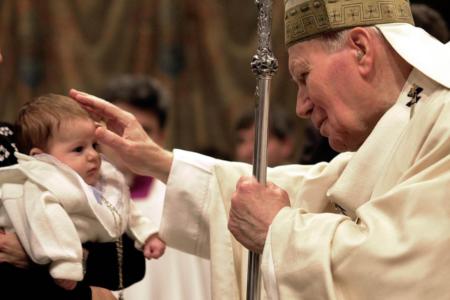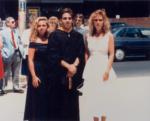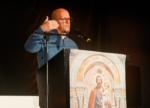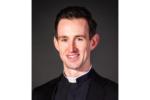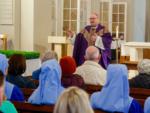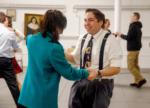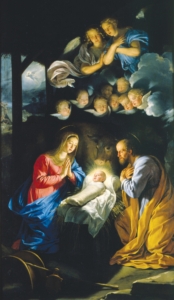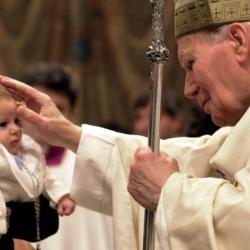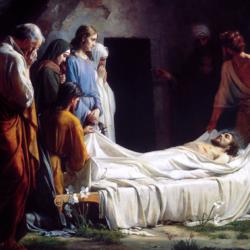Cardinal O'Malley's Christmas message for families
At Christmas we are summoned to Bethlehem where faith gathers us to witness the Incarnation. With the eyes of our heart we gaze at God's humility and love which comes to us as a child. Like Mary we ponder this mystery in our hearts. God has become one of us. He is part of a family.
Jesus' longest sermon is the 30 years of his hidden life at Nazareth. Our Savior wants to teach us about the importance of family life. With Mary and Joseph, Jesus lives a life of family, of community, of love, of prayer, of work and of play. It was a life that prepared him for his mission.
The Christmas cards we send and receive -- the stained glass windows in our Churches, the manger under the tree -- are the family album of our family, the family of Jesus.
Christmas affords us an opportunity to behold once again these signs of our faith which invite us to build on the foundations of Bethlehem and Nazareth.
Jesus' love and humility and his obedience to the will of the Father are an example to us and the secret of building a strong family life. We begin our life of discipleship in baptism. There God gives us newness of life and calls us to holiness. We must discern our individual vocation in an atmosphere of prayer and trust. For some, the path to God and to holiness leads through the carpenter shop, the factory or the office. For many, the call is to marry and raise a family. The vocation of Catholic marriage is "to marry in the Lord," to make a life-long covenant with one's spouse and with God. It is a profoundly religious act and has far reaching repercussions in the life of the community.
To a believer, love means a decision, a surrender and self-sacrifice. Love requires great strength and great humility. Learning how to love is the best preparation for marriage and family. We learn love by experiencing God's love, and we teach love by loving. In the Church we talk about conversion; what it means is learning to turn our back on our selfishness and sin in order to grow closer to God, the source of all love. Some people fear that loving God diminishes our capacity to love our family and friends. Actually, quite the opposite is true. The greater our love for God, the more it will enhance our love for others. Certainly the life of Mother Teresa is a clear indication of this.
For the family to be a school of love, it is necessary for the members of the family to have time together. This is often difficult in today's world because of work schedules and the many demands on our time. Nevertheless, if the health of the family is going to be a priority, the family must come together, especially at the dinner table. The dinner table can be the altar in the home. More than all the negotiating tables at the United Nations or the White House, what happens at the dinner table can profoundly affect people's lives and the future of society. When a family can pray together, get to know one another and share their aspirations and fears, they experience a sense of belonging, an identity.
A family also needs to share together at the Lord's Table, the Sunday Eucharist. It is there that we experience our spiritual family in the parish and are nourished by the Word of God and the Bread of Life, Holy Communion.
One of the painstaking, yet beautiful tasks of young parents is teaching their children to speak. I am always touched to see a young Mom or Dad patiently repeating a sound, a word or a phrase. Every parent accepts that responsibility lovingly because they realize how important speech is. By the same token, these parents must be teachers of prayer. They must teach their children to speak to God. Children are often bored at Mass if they do not know how to pray. When we pray, going to Mass makes sense.
One of the best ways to revitalize the family is to recapture the sacredness of the Lord's Day. At our Sunday Eucharist we gather as the household of the faithful. Together we witness to the world that Jesus Christ is risen and we recognize him "in the breaking of the Bread." The miracle of the Mass takes place to forge us into a spiritual family, the Body of Christ, the Church.
The Eucharist finds its origins in the Infant in the manger at Bethlehem. It is because Christ is born with a human body, of the Virgin Mary, that he can later give us the same body under the form of bread and wine. The very name Bethlehem means "House of Bread," and the first crib was a manger, a box containing feed for the flock. Now the tabernacle is the manger that contains the body and blood of Christ, there to share our poverty and to feed us, strengthen us for our mission in the world.
Nothing is more formative of children than the example of parents and their involvement in the religious formation of their children. Catholic parents are usually very good about sending their children to religious education, CCD, especially so that their children can make their First Communion, and receive Confirmation, but this is not enough. The parent's example and interest are paramount in the faith formation of their children. Parents must speak to their children about God, the Church, the Sacraments and the Commandments. Children need to see the faith lived in the lives of the important people in their lives. The selection of godparents and sponsors should reflect this concern to provide the children with role models whose lives and values allow the child to see our faith as a way of life, a life of spiritual relationships that bind us to God, to the saints, to all our brothers and sisters in the Lord.
Parents, when you take your children to visit the creche in your parish Church take them also to the tabernacle to adore the Messiah who received the homage of the shepherds, the Magi and of all creation. Talk to your children about Jesus' love for them, his desire to be close to us, to feed us.
The manger scene also teaches us about what is truly important. The center is Christ. The center is a baby. The baby is surrounded by loving parents and not much else. The greatest thing a man can give his children is to love their mother. The greatest thing a mother can give her children is to love their father. The love of Mary and Joseph is the only treasure the Christ Child has. Being born in poverty and simplicity is God's way of speaking to us about what is truly important. Eisenhower used to say: "When I was young, we were very poor, but we didn't know it." He did not notice his family's poverty because there was so much love and joy in his home.
As you explain to your children that "There was no room at the inn," teach them to have compassion for the poor, the sick and the suffering. Teach them that we need to share what we have received. When we do that, we are giving gifts to the Christ Child Himself. It might also be an opportunity to tell our children that success is not measured in money but in goodness and love.
What will the future bring? Much depends on our families and our ability to form new generations of families firmly committed to following Jesus Christ. To do that, we must love them very much, pray together, spend time together and teach our children how to love by showing them what love is. The star is over the manger. Let us go to Bethlehem to glimpse God's love in the face of a child in a loving family.
